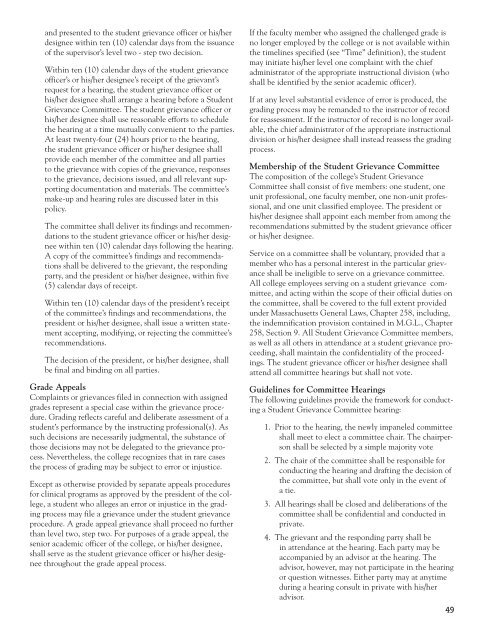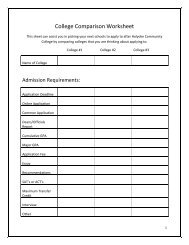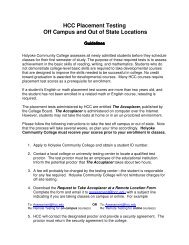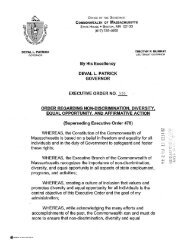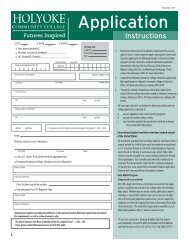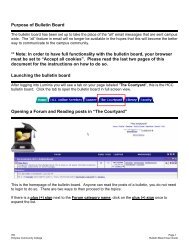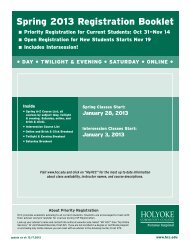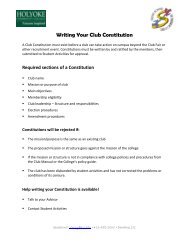Student Handbook 2010-2011 - Holyoke Community College
Student Handbook 2010-2011 - Holyoke Community College
Student Handbook 2010-2011 - Holyoke Community College
You also want an ePaper? Increase the reach of your titles
YUMPU automatically turns print PDFs into web optimized ePapers that Google loves.
and presented to the student grievance officer or his/herdesignee within ten (10) calendar days from the issuanceof the supervisor’s level two - step two decision.Within ten (10) calendar days of the student grievanceofficer’s or his/her designee’s receipt of the grievant’srequest for a hearing, the student grievance officer orhis/her designee shall arrange a hearing before a <strong>Student</strong>Grievance Committee. The student grievance officer orhis/her designee shall use reasonable efforts to schedulethe hearing at a time mutually convenient to the parties.At least twenty-four (24) hours prior to the hearing,the student grievance officer or his/her designee shallprovide each member of the committee and all partiesto the grievance with copies of the grievance, responsesto the grievance, decisions issued, and all relevant supportingdocumentation and materials. The committee’smake-up and hearing rules are discussed later in thispolicy.The committee shall deliver its findings and recommendationsto the student grievance officer or his/her designeewithin ten (10) calendar days following the hearing.A copy of the committee’s findings and recommendationsshall be delivered to the grievant, the respondingparty, and the president or his/her designee, within five(5) calendar days of receipt.Within ten (10) calendar days of the president’s receiptof the committee’s findings and recommendations, thepresident or his/her designee, shall issue a written statementaccepting, modifying, or rejecting the committee’srecommendations.The decision of the president, or his/her designee, shallbe final and binding on all parties.Grade AppealsComplaints or grievances filed in connection with assignedgrades represent a special case within the grievance procedure.Grading reflects careful and deliberate assessment of astudent’s performance by the instructing professional(s). Assuch decisions are necessarily judgmental, the substance ofthose decisions may not be delegated to the grievance process.Nevertheless, the college recognizes that in rare casesthe process of grading may be subject to error or injustice.Except as otherwise provided by separate appeals proceduresfor clinical programs as approved by the president of the college,a student who alleges an error or injustice in the gradingprocess may file a grievance under the student grievanceprocedure. A grade appeal grievance shall proceed no furtherthan level two, step two. For purposes of a grade appeal, thesenior academic officer of the college, or his/her designee,shall serve as the student grievance officer or his/her designeethroughout the grade appeal process.If the faculty member who assigned the challenged grade isno longer employed by the college or is not available withinthe timelines specified (see “Time” definition), the studentmay initiate his/her level one complaint with the chiefadministrator of the appropriate instructional division (whoshall be identified by the senior academic officer).If at any level substantial evidence of error is produced, thegrading process may be remanded to the instructor of recordfor reassessment. If the instructor of record is no longer available,the chief administrator of the appropriate instructionaldivision or his/her designee shall instead reassess the gradingprocess.Membership of the <strong>Student</strong> Grievance CommitteeThe composition of the college’s <strong>Student</strong> GrievanceCommittee shall consist of five members: one student, oneunit professional, one faculty member, one non-unit professional,and one unit classified employee. The president orhis/her designee shall appoint each member from among therecommendations submitted by the student grievance officeror his/her designee.Service on a committee shall be voluntary, provided that amember who has a personal interest in the particular grievanceshall be ineligible to serve on a grievance committee.All college employees serving on a student grievance committee,and acting within the scope of their official duties onthe committee, shall be covered to the full extent providedunder Massachusetts General Laws, Chapter 258, including,the indemnification provision contained in M.G.L., Chapter258, Section 9. All <strong>Student</strong> Grievance Committee members,as well as all others in attendance at a student grievance proceeding,shall maintain the confidentiality of the proceedings.The student grievance officer or his/her designee shallattend all committee hearings but shall not vote.Guidelines for Committee HearingsThe following guidelines provide the framework for conductinga <strong>Student</strong> Grievance Committee hearing:1. Prior to the hearing, the newly impaneled committeeshall meet to elect a committee chair. The chairpersonshall be selected by a simple majority vote2. The chair of the committee shall be responsible forconducting the hearing and drafting the decision ofthe committee, but shall vote only in the event ofa tie.3. All hearings shall be closed and deliberations of thecommittee shall be confidential and conducted inprivate.4. The grievant and the responding party shall bein attendance at the hearing. Each party may beaccompanied by an advisor at the hearing. Theadvisor, however, may not participate in the hearingor question witnesses. Either party may at anytimeduring a hearing consult in private with his/heradvisor.49


